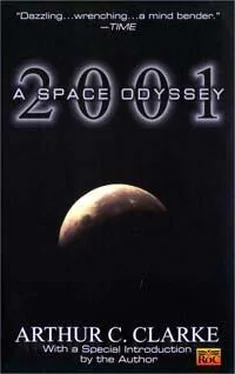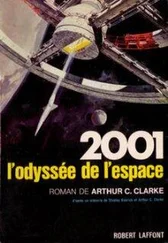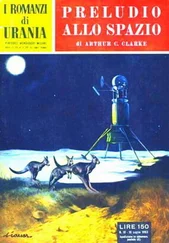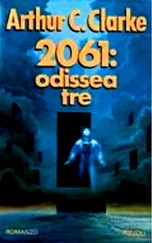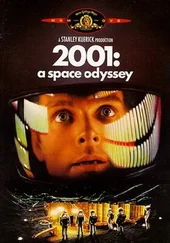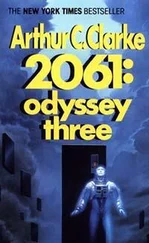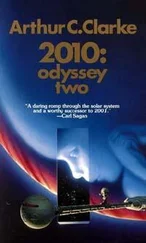From their side of the stream, in the never-violated safety of their own territory, the Others first saw Moon-Watcher and a dozen males of his tribe as a moving frieze against the dawn sky. At once they began to scream their daily challenge; but this time, there was no answer.
Steadily, purposefully – above all, silently – Moon-Watcher and his band descended the low hillock that overlooked the river; and as they approached, the Others became suddenly quiet. Their ritual rage ebbed away, to be replaced by a mounting fear. They were dimly aware that something had happened, and that this encounter was unlike all those that had ever gone before.
The bone clubs and knives that Moon-Watcher's group carried did not alarm them, for they did not understand their purpose. They only knew that their rivals' movements were now imbued with determination, and with menace.
The party stopped at the water's edge, and for a moment the Others' courage revived. Led by One-Ear, they halfheartedly resumed their battle chant. It lasted only a few seconds before a vision of terror struck then dumb.
Moon-Watcher raised his arms high into the air, revealing the burden that until now had been concealed by the hirsute bodies of his companions. He was holding a stout branch, and impaled upon it was the bloody head of the leopard. The mouth had been jammed open with a stick, and the great fangs gleamed a ghastly white in the first rays of the rising sun.
Most of the Others were too paralyzed with fright to move; but some began a slow, stumbling retreat. That was all the encouragement that Moon-Watcher needed. Still holding the mangled trophy above his head, he started to cross the stream. After a moment's hesitation, his companions splashed after him.
When Moon-Watcher reached the far side, One-Ear was still standing his ground. Perhaps he was too brave or too stupid to run; perhaps he could not really believe that this outrage was actually happening. Coward or hero, it made no difference in the end, as the frozen snarl of death came crashing down upon his uncomprehending head.
Shrieking with fright, the Others scattered into the bush; but presently they would return, and soon they would forget their lost leader.
For a few seconds Moon-Watcher stood uncertainly above his new victim, trying to grasp the strange and wonderful fact that the dead leopard could kill again. Now he was master of the world, and he was not quite sure what to do next.
But he would thinkof something.
A new animal was abroad on the planet, spreading slowly out from the African heartland. It was still so rare that a hasty census might have overlooked it, among the teeming billions of creatures roving over land and sea. There was no evidence, as yet, that it would prosper or even survive: on this world where so many mightier beasts had passed away, its fate still wavered in the balance.
In the hundred thousand years since the crystals had descended upon Africa, the man-apes had invented nothing. But they had started to change, and had developed skills which no other animal possessed. Their bone clubs had increased their reach and multiplied their strength; they were no longer defenseless against the predators with whom they had to compete. The smaller carnivores they could drive away from their own kills; the larger ones they could at least discourage, and sometimes put to flight.
Their massive teeth were growing smaller, for they were no longer essential. The sharp-edged stones that could be used to dig out roots, or to cut and saw through tough flesh or fiber, had begun to replace them, with immeasurable consequences. No longer were the man-apes faced with starvation when their teeth became damaged or worn; even the crudest tools could add many years to their lives. And as their fangs diminished, the shape of their face started to alter; the snout receded, the massive jaw became more delicate, the mouth able to make more subtle sounds. Speech was still a million years away, but the first steps toward it had been taken.
And then the world began to change. In four great waves, with two hundred thousand years between their crests, the Ice Ages swept by, leaving their mark on all the globe. Outside the tropics, the glaciers slew those who had prematurely left theft ancestral home; and everywhere they winnowed out the creatures who could not adapt.
When the ice had passed, so had much of the planet's early life – including the man-apes. But, unlike so many others, they had left descendants; they had not merely become extinct – they had been transformed. The toolmakers had been remade by their own tools.
For in using clubs and flints, their hands had developed a dexterity found nowhere else in the animal kingdom, permitting them to make still better tools, which in turn had developed their limbs and brains yet further. It was an accelerating, cumulative process; and at its end was Man.
The first true men had tools and weapons only a little better than those of their ancestors a million years earlier, but they could use them with far greater skill.
And somewhere in the shadowy centuries that had gone before they had invented the most essential tool of all, though it could be neither seen nor touched. They had learned to speak, and so had won their first great victory over Time. Now the knowledge of one generation could be handed on to the next, so that each age could profit from those that had gone before.
Unlike the animals, who knew only the present, Man had acquired a past; and he was beginning to grope toward a future.
He was also learning to harness the forces of nature; with the taming of fire, he had laid the foundations of technology and left his animal origins far behind. Stone gave way to bronze, and then to iron. Hunting was succeeded by agriculture. The tribe grew into the village, the village into the town. Speech became eternal, thanks to certain marks on stone and clay and papyrus. Presently he invented philosophy, and religion. And he peopled the sky, not altogether inaccurately, with gods.
As his body became more and more defenseless, so his means of offense became steadily more frightful. With stone and bronze and iron and steel he had run the gamut of everything that could pierce and slash, and quite early in time he had learned how to strike down his victims from a distance. The spear, the bow, the gun, and finally the guided missile had given him weapons of infinite range and all but infinite power.
Without those weapons, often though he had used them against himself, Man would never have conquered his world. Into them he had put his heart and soul, and for ages they had served him well.
But now, as long as they existed, he was living on borrowed time.
No matter how many times you left Earth, Dr. Heywood Floyd told himself, the excitement never really palled. He had been to Mars once, to the Moon three times, and to the various space stations more often than he could remember. Yet as the moment of takeoff approached, he was conscious of a rising tension, a feeling of wonder and awe – yes; and of nervousness – which put him on the same level as any Earthlubber about to receive his first baptism of space.
The jet that had rushed him here from Washington, after that midnight briefing with the President, was now dropping down toward one of the most familiar, yet most exciting, landscapes in all the world. There lay the first two generations of the Space Age, spanning twenty miles of the Florida coast to the south, outlined by winking red warning lights, were the giant gantries of the Saturns and Neptunes, that had set men on the path to the planets, and had now passed into history. Near the horizon, a gleaming silver tower bathed in floodlights, stood the last of the Saturn V's, for almost twenty years a national monument and place of pilgrimage. Not far away, looming against the sky like a man-made mountain, was the incredible bulk of the Vehicle Assembly Building, still the largest single structure on Earth.
Читать дальше
